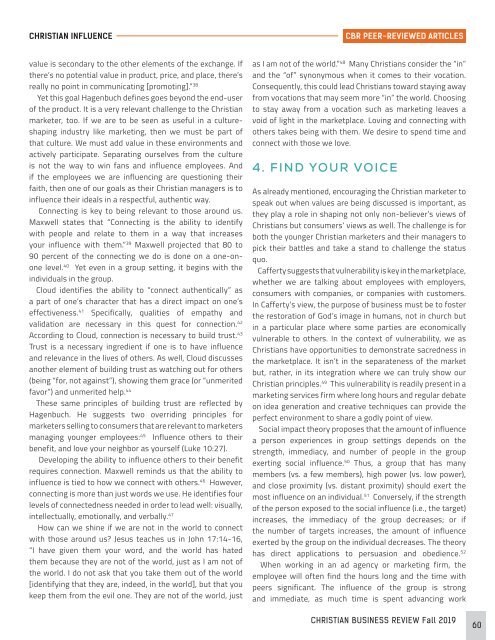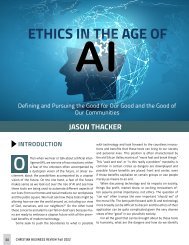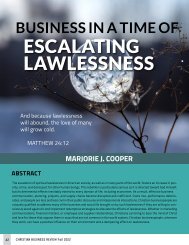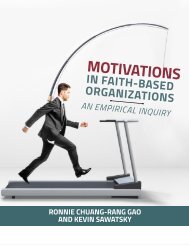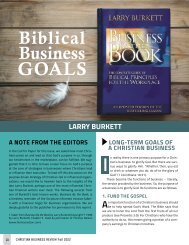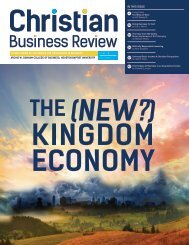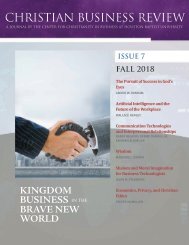Christian Business Review 2019: Workplace Practices That Glorify God (Issue 8)
You also want an ePaper? Increase the reach of your titles
YUMPU automatically turns print PDFs into web optimized ePapers that Google loves.
CHRISTIAN INFLUENCE<br />
CBR PEER-REVIEWED ARTICLES<br />
value is secondary to the other elements of the exchange. If<br />
there’s no potential value in product, price, and place, there’s<br />
really no point in communicating [promoting].” 38<br />
Yet this goal Hagenbuch defines goes beyond the end-user<br />
of the product. It is a very relevant challenge to the <strong>Christian</strong><br />
marketer, too. If we are to be seen as useful in a cultureshaping<br />
industry like marketing, then we must be part of<br />
that culture. We must add value in these environments and<br />
actively participate. Separating ourselves from the culture<br />
is not the way to win fans and influence employees. And<br />
if the employees we are influencing are questioning their<br />
faith, then one of our goals as their <strong>Christian</strong> managers is to<br />
influence their ideals in a respectful, authentic way.<br />
Connecting is key to being relevant to those around us.<br />
Maxwell states that “Connecting is the ability to identify<br />
with people and relate to them in a way that increases<br />
your influence with them.” 39 Maxwell projected that 80 to<br />
90 percent of the connecting we do is done on a one-onone<br />
level. 40 Yet even in a group setting, it begins with the<br />
individuals in the group.<br />
Cloud identifies the ability to “connect authentically” as<br />
a part of one’s character that has a direct impact on one’s<br />
effectiveness. 41 Specifically, qualities of empathy and<br />
validation are necessary in this quest for connection. 42<br />
According to Cloud, connection is necessary to build trust. 43<br />
Trust is a necessary ingredient if one is to have influence<br />
and relevance in the lives of others. As well, Cloud discusses<br />
another element of building trust as watching out for others<br />
(being “for, not against”), showing them grace (or “unmerited<br />
favor”) and unmerited help. 44<br />
These same principles of building trust are reflected by<br />
Hagenbuch. He suggests two overriding principles for<br />
marketers selling to consumers that are relevant to marketers<br />
managing younger employees: 45 Influence others to their<br />
benefit, and love your neighbor as yourself (Luke 10:27).<br />
Developing the ability to influence others to their benefit<br />
requires connection. Maxwell reminds us that the ability to<br />
influence is tied to how we connect with others. 46 However,<br />
connecting is more than just words we use. He identifies four<br />
levels of connectedness needed in order to lead well: visually,<br />
intellectually, emotionally, and verbally. 47<br />
How can we shine if we are not in the world to connect<br />
with those around us? Jesus teaches us in John 17:14-16,<br />
“I have given them your word, and the world has hated<br />
them because they are not of the world, just as I am not of<br />
the world. I do not ask that you take them out of the world<br />
[identifying that they are, indeed, in the world], but that you<br />
keep them from the evil one. They are not of the world, just<br />
as I am not of the world.” 48 Many <strong>Christian</strong>s consider the “in”<br />
and the “of” synonymous when it comes to their vocation.<br />
Consequently, this could lead <strong>Christian</strong>s toward staying away<br />
from vocations that may seem more “in” the world. Choosing<br />
to stay away from a vocation such as marketing leaves a<br />
void of light in the marketplace. Loving and connecting with<br />
others takes being with them. We desire to spend time and<br />
connect with those we love.<br />
4. FIND YOUR VOICE<br />
As already mentioned, encouraging the <strong>Christian</strong> marketer to<br />
speak out when values are being discussed is important, as<br />
they play a role in shaping not only non-believer’s views of<br />
<strong>Christian</strong>s but consumers’ views as well. The challenge is for<br />
both the younger <strong>Christian</strong> marketers and their managers to<br />
pick their battles and take a stand to challenge the status<br />
quo.<br />
Cafferty suggests that vulnerability is key in the marketplace,<br />
whether we are talking about employees with employers,<br />
consumers with companies, or companies with customers.<br />
In Cafferty’s view, the purpose of business must be to foster<br />
the restoration of <strong>God</strong>’s image in humans, not in church but<br />
in a particular place where some parties are economically<br />
vulnerable to others. In the context of vulnerability, we as<br />
<strong>Christian</strong>s have opportunities to demonstrate sacredness in<br />
the marketplace. It isn’t in the separateness of the market<br />
but, rather, in its integration where we can truly show our<br />
<strong>Christian</strong> principles. 49 This vulnerability is readily present in a<br />
marketing services firm where long hours and regular debate<br />
on idea generation and creative techniques can provide the<br />
perfect environment to share a godly point of view.<br />
Social impact theory proposes that the amount of influence<br />
a person experiences in group settings depends on the<br />
strength, immediacy, and number of people in the group<br />
exerting social influence. 50 Thus, a group that has many<br />
members (vs. a few members), high power (vs. low power),<br />
and close proximity (vs. distant proximity) should exert the<br />
most influence on an individual. 51 Conversely, if the strength<br />
of the person exposed to the social influence (i.e., the target)<br />
increases, the immediacy of the group decreases; or if<br />
the number of targets increases, the amount of influence<br />
exerted by the group on the individual decreases. The theory<br />
has direct applications to persuasion and obedience. 52<br />
When working in an ad agency or marketing firm, the<br />
employee will often find the hours long and the time with<br />
peers significant. The influence of the group is strong<br />
and immediate, as much time is spent advancing work<br />
CHRISTIAN BUSINESS REVIEW Fall <strong>2019</strong><br />
60 2


